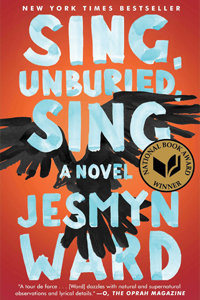
Book Club
Jesmyn Ward
Monday, September 16, 2019
7 – 8:30 p.m.
Synopsis
National Book Award Winner
Drawing on Morrison and Faulkner, The Odyssey and the Old Testament, Ward gives us an epochal story, a journey through Mississippi’s past and present that is both an intimate portrait of a family and an epic tale of hope and struggle.
Ward is a major American writer, multiply awarded and universally lauded, and in Sing, Unburied, Sing she is at the height of her powers.
________________________________________
Jojo and his toddler sister, Kayla, live with their grandparents, Mam and Pop, and the occasional presence of their drug-addicted mother, Leonie, on a farm on the Gulf Coast of Mississippi.
Leonie is simultaneously tormented and comforted by visions of her dead brother, which only come to her when she’s high; Mam is dying of cancer; and quiet, steady Pop tries to run the household and teach Jojo how to be a man.
When the white father of Leonie’s children is released from prison, she packs her kids and a friend into her car and sets out across the state for Parchman farm, the Mississippi State Penitentiary, on a journey rife with danger and promise.
Sing, Unburied, Sing grapples with the ugly truths at the heart of the American story and the power, and limitations, of the bonds of family. Rich with Ward’s distinctive, musical language, Sing, Unburied, Sing is a majestic new work and an essential contribution to American literature. (From the publisher.)
Reading Group Discussion Questions
1. The novel begins with Jojo’s thoughts, “I like to think I know what death is” and “I want Pop to know I can get bloody” (page 1). How do these thoughts set the stage for Jojo’s birthday and what follows?
2. How does Given’s death shape Leonie, Pop, and Mam? How does it change how they relate to each other?
3. Why does Given begin appearing to Leonie after Michael goes to jail, whenever she gets high? Why doesn’t Leonie tell anyone about seeing Given?
4. Leonie says from the first moment she saw Michael, he “saw me.… Saw the walking wound I was and came to be my balm” (page 54). Discuss how guilt, desire, taboo, defiance, and grief are at work in Michael and Leonie’s connection to each other.
5. What does Leonie get out of her friendship with Misty? What does Jojo see in the dynamics at play between Misty and Leonie?
6. Discuss the gris-gris bag from Pop that Jojo finds hidden in his clothes (page 63). What does each item signify? Why must Jojo hide it from Leonie?
7. Why can Pop only tell Richie’s story to Jojo in pieces (page 70)? What do you think Pop wants or needs Jojo to understand?
8. As Leonie looks at Jojo and Kayla in the back seat on their way to pick up Michael, she thinks, “Sometimes, when Jojo’s playing with Kayla or sitting in Mama’s room rubbing her hands or helping her turn over in the bed, I look at him and see a hungry girl” (page 95). Why does Leonie see this “hungry girl” in Jojo?
9. Why is Jojo convinced that “Leonie kill things” (page 108)? Why are Leonie and Jojo always in conflict, especially concerning how to take care of Kayla?
10. When Richie joins Jojo at Parchman, is it a surprise? Why is Richie tied to Parchman? And to River?
11. Why does Michael brawl with Big Joseph and ultimately choose to leave with Leonie rather than stay with his parents (page 208)?
12. When Mam insists that Leonie help her die, to “Let me leave with something of myself” (page 216), what makes Leonie hesitate? Why does she wish for Given to be there in that moment?
13. What does Richie mean when he tells Jojo, “I can’t. Come inside. I tried. Yesterday. There has to be some need, some lack. Like a keyhole. Makes it so I can come in. But after all that — your mam, your uncle. Your mama. I can’t. You’ve…changed. Ain’t no need. Or at least, ain’t no need big enough for a key”? (page 281)
14. Water plays an important role throughout the novel. Pop’s name is River. Mam is known as the “saltwater woman.” The town and prison where Pop and Michael are incarcerated are named for the “parched man.” Jojo wonders who the parched man is, if he looked like Pop, Jojo, or Michael. Which characters seem to need water? Which are of the water?
15. Kayla is central to the final scene of the novel, with the “tree of ghosts.” Jojo describes her: “Her eyes Michael’s, her nose Leonie’s, the set of her shoulders Pop’s, and the way she looks upward, like she is measuring the tree, all Mam. But something about the way she stands, the way she takes all the pieces of everybody and holds them together, is all her. Kayla” (page 284). How is it fitting that Kayla closes the story, telling the ghosts to “Go home” and singing to them and to Jojo?
(Questions issued by the publisher.)
Additional Book Club Resources
Other Works by Jesmyn Ward
• Where the Line Bleeds (2008)
• Salvage the Bones (2011)
• Men We Reaped: A Memoir (2013)
• The Fire This Time: A New Generation Speaks about Race (2016)
If You Liked Sing, Unburied, Sing, May We Recommend …
American Prison, Shane Bauer
Treeborne, Caleb Johnson
The Lauras, Sara Taylor
No One Is Coming to Save Us, Stephanie Powell Watts
Red Now and Laters, Marcus J. Guillory
Songs Yet Sung, James McBride
The Turner House, Angela Flournoy
Long Division, Kiese Laymon
Boy, Snow, Bird, Helen Oyeyemi
Another Brooklyn, Jacqueline Woodson
Links of Interest for Your Book Club Discussion
Goodreads.com Author Page
NPR Interview: “For Jesmyn Ward, Writing Means Telling The ‘Truth About The Place That I Live In”
Washington Post Review of Sing, Unburied, Sing
The New Yorker Book Review of Sing, Unburied, Sing
Powell’s Interview: Jesmyn Ward
The Guardian Interview: “Black Girls are Silenced, Misunderstood, and Underestimated”
Bomb Magazine: Ghosts of History: An Interview with Jesmyn Ward
The Times Literary Supplement: Twenty Questions with Jesmyn Ward
VIDEO: Jesmyn Ward Interviewed by Natalie Moore – “Sing, Unburied, Sing: A Conversation with Jesmyn Ward”
VIDEO: PBS News Hour: “Jesmyn Ward Answers Your Questions About Sing, Unburied, Sing”

